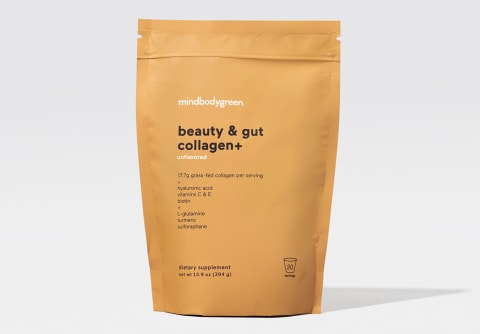Advertisement
Do You Like Black Coffee? It's Probably Because Of Your Genes, Study Says


How do you take your coffee? Do you drink it black, with a splash of milk, or do you prefer rich, creamy, collagen-infused brews? Well, according to a new study in the journal Scientific Reports, your flavor preferences might actually have everything to do with your DNA.
Specifically, researchers found a genetic variant that reflects a faster caffeine metabolism1—and, not-so-coincidentally, these individuals also have a thing for black coffee.
The link between DNA & coffee preferences.
According to the study, participants who had an affinity for black coffee also had a genetic variant that helped them metabolize the caffeine faster, and so they associate the alertness and mental clarity they feel with the pure coffee flavor.
"Basically, individuals who have genetic factors that contribute to increased caffeine metabolism learn to appreciate the taste because of that higher metabolism and the psychostimulant effects that they present with," lead study author Marilyn Cornelis, Ph.D., associate professor of preventive medicine at Northwestern, tells mbg over the phone. "They learn to equate those psychostimulant effects to that bitter taste." Essentially: If you have an affinity for black coffee, it might not actually be the taste you love but the energy you feel.
Cornelis and her team found strong patterns with tea and dark chocolate as well, items that also contain caffeine (albeit at much smaller concentrations than coffee). "It just shows that what we're observing with coffee also extends to other caffeine-containing foods and beverages," she says. "These individuals who have genetic factors contributing to increased caffeine metabolism prefer black coffee over sweetened coffee, dark chocolate over milk chocolate, as well as unsweetened tea versus sweetened tea." So, say, if you're partial to raw, organic cocoa blends over a mild milk chocolate square, again your caffeine metabolism might be playing a role.
What this means for future research.
As the field of research for caffeine continues to expand, understanding these genetic variants for caffeine metabolism provides an opportunity to study the potential health benefits of this famous energizing phytonutrient way more precisely.
"In classic epidemiology, we always have these issues of confounding," says Cornelis. "We often assume that all heavy coffee drinkers present with similar characteristics, but we now know that they have genetic differences, and those genetic differences also contribute to how they consume their coffee." After all, Cornelis adds, someone who drinks their coffee black may experience very different health outcomes than someone who drinks coffee filled with cream and sugar.
A perhaps obvious distinction, but studies have yet to make that call: "Most of the research that we hear in popular media just talks about how coffee has been associated with this outcome, or it's adversely associated with that outcome, but they don't mention how the coffee is prepared—and that makes a difference," Cornelis notes.
The takeaway.
If you've got a thing for black coffee, dark chocolate, or unsweetened tea, you might have a genetic variant that reflects a faster caffeine metabolism—so it's not exactly the flavor you love but the mental boost you feel. Something to sip on while you mull over the coffee shop menu.
Watch Next
Enjoy some of our favorite clips from classes
Enjoy some of our favorite clips from classes
What Is Meditation?
Mindfulness/Spirituality | Light Watkins
Box Breathing
Mindfulness/Spirituality | Gwen Dittmar
What Breathwork Can Address
Mindfulness/Spirituality | Gwen Dittmar
The 8 Limbs of Yoga - What is Asana?
Yoga | Caley Alyssa
Two Standing Postures to Open Up Tight Hips
Yoga | Caley Alyssa
How Plants Can Optimize Athletic Performance
Nutrition | Rich Roll
What to Eat Before a Workout
Nutrition | Rich Roll
How Ayurveda Helps Us Navigate Modern Life
Nutrition | Sahara Rose
Messages About Love & Relationships
Love & Relationships | Esther Perel
Love Languages
Love & Relationships | Esther Perel
What Is Meditation?
Box Breathing
What Breathwork Can Address
The 8 Limbs of Yoga - What is Asana?
Two Standing Postures to Open Up Tight Hips
How Plants Can Optimize Athletic Performance
What to Eat Before a Workout
How Ayurveda Helps Us Navigate Modern Life
Messages About Love & Relationships
Love Languages
Advertisement

Your Grandma's Go-To Supplement Is Once Again Popular (For A Good Reason)
Molly Knudsen, M.S., RDN

This Type Of Fat Is Vital For Women's Health — Are You Getting Enough?
Molly Knudsen, M.S., RDN

New Study Confirms The 3 Habits That Age Your Brain Faster
Molly Knudsen, M.S., RDN

Your Grandma's Go-To Supplement Is Once Again Popular (For A Good Reason)
Molly Knudsen, M.S., RDN

This Type Of Fat Is Vital For Women's Health — Are You Getting Enough?
Molly Knudsen, M.S., RDN

New Study Confirms The 3 Habits That Age Your Brain Faster
Molly Knudsen, M.S., RDN












